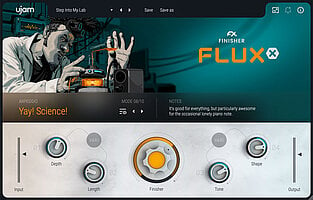The 5 Basics of Music Production
A quick guide to the most important areas to focus on, whether you’re just starting out or simply feel stuck at any point in your music career
MAY 23RD, 2021
Not sure where to start and looking for all the resources you need in one place? This article will give you the fundamentals and link you to all the info and resources you need to start producing quality music now, including mindset, gear, theory, plugins, as well as releasing and promoting your music!
1. Self doubt and frustration are part of the game … but the result is well worth it
The first thing you need to know going into music production is that you’ll experience plenty of moments where you want nothing more than to quit — every single producer goes through this, and it’s completely normal! We want to be masters of music production from the very beginning, and we get discouraged when we compare our work to artists whose music we love. But if you stay consistent and practice consistently, your music will improve dramatically. Give it time for your abilities to catch up to your tastes and expectations, and the entire process will be worth it a hundred times over.
That said, it still helps to have steps in place whenever you need a reminder of the skills that await you if you stick it out.
When you get frustrated, articulate the problem first. Maybe you don’t fully understand how to use your DAW (digital audio workstation), you’re stuck with no inspiration, or you know exactly what sound you want to create but have no idea how to achieve it. Each of these problems has a different answer, respectively:
- DAW frustrating you? Read the manual for your DAW. It’s boring, yes — but you’ll be amazed at how many of your questions get answered as you read, and you’ll have a better framework which can eliminate most of this frustration in the future.
- No inspiration? Check out our article, How to Write a Song Quickly. It contains a ton of tips for starting and finishing songs when you’re feeling stuck, while ensuring this happens less and less often in the future.
- Can’t translate your ideas into music? This purely comes down to practice and learning as much as you possibly can. Study different genres along their production techniques and put them into practice so you own the knowledge. This is one of the most common and frustrating issues to have, and the only solution is to make a lot more music!
2. Gear and your studio setup
If you’re getting started with music production and don’t have much in the way of gear, check out our article, The Ultimate Buyer’s Guide for Music Producers — you don’t need much, but you do need a digital audio interface, a DAW (Studio One, Live, Logic Pro, etc.), headphones or monitors, and possibly a MIDI keyboard / controller and a decent microphone. The article reveals everything you need to get started when you’re ready to start buying gear!
Focus only on what you absolutely need at the beginning — not soundproofing your entire room, getting the best computer or high-end studio monitors. If your rig makes sound, you can hear the whole frequency spectrum and you can input notes, you have enough to get started. Upgrade as your music career progresses, but for now, do whatever it takes to create and release music rather than striving for perfection and professionalism. Those will come with time!
There is an aspect of your space that you want to master as soon as possible, though — you want to structure it in the way that most consistently enables you to work quickly and in a relaxed manner. Whether it’s putting up posters from your favorite game or movie franchise, keeping your desk squeaky clean, ensuring you don’t work where you sleep, whatever it may be ... make sure your production space is designed to help you enjoy it as much as possible! This can make all the difference when a mix isn’t coming together and you want nothing more than to walk away from the DAW session forever. Making your production space your safe haven can provide that small boost you need to stay consistent and stick it out through the tough stretches.
There you have it: when you’re on a budget, do all the small things you can to make music production a little more enjoyable!
3. Music theory and composition
While not strictly necessary, having a strong foundation in music theory will make your life much easier — ideas will flow from your brain into the DAW session more readily, and you’ll spend less time wondering what chords, song structure, etc. to use. For a thorough primer on music theory, you can read our article, How to Learn Music Theory Quickly, which should give you a solid start on what areas to focus on and which resources to use.
Naturally, the more theory you know, the better — but a more useful benchmark is what genres you want to produce. If you want to create excellent R&B, you need to know chords and harmony inside out, which you can discover more about in How to Create a Chord Progression. Without any sarcasm or shade, there are certain genres where you can get away with knowing much less, such as dubstep or rap! (This is because the focus is on a different aspect of music; with dubstep it’s sound design, and with rap it’s the lyrics. However, if you develop great music theory chops, you’ll be able to get much more creative in the writing and production process, so don’t discount it!)
Regardless of genre or style, however, you’ll want to have a handle on how to construct songs and develop your musical ideas. It’s critical to understand how to create engaging melodies, and this skill translates to every genre (and probably always will) — give this How to Find a Melody Quickly article a read if you need a repeatable method for finding melodies, especially if right now you struggle with making them consistently.
4. Plugins and virtual instruments
This is the meat and potatoes of music production! Plugins are what allow you to create and modify sounds in your DAW, and there are endless varieties of them on the market. The more you have, the more sonic possibilities are available to you … but you’ll be much more productive if you first deep dive into a few and focus on those until you find you’re hitting a wall with what you can do. These are essentially mini-programs that can run within a DAW to help you achieve the sounds you’re looking for (and some you didn’t know were possible!). If you want to learn more about exactly what virtual instruments are, check out our Comprehensive Guide to Virtual Instruments.
Aside from the sheer amount of money you could end up spending, there’s a hidden danger in jumping from plugin to plugin too often: never discovering everything they can do. You might buy 10 plugins and then discover that you could already create every sound you need with just one! In the early stages, focus on learning one synth extremely well, relying on a couple effect units such as our Finisher series, and any acoustic instrument sample libraries you need, such as STRIIIINGS. Learn everything you can about them, then push them to their limits to get everything out of them you can!
5. Promoting and releasing your music
Ahh, finally — breathing a sigh of relief as your music finally goes out into the world! This process is far less complicated than learning the ins and outs of a DAW, but we’ll make it as clear as we can nonetheless.
After you ‘bounce’ or ‘print’ your finished mix, there are a number of services you can choose to submit the finished product to all the major platforms such as Spotify and Apple Music. These distributors include Distrokid, CD Baby, TuneCore, and plenty of others, which all offer similar services with slightly different pricing models. They make it much simpler than attempting to handle this process yourself, so you’ll definitely want to use a music distribution service!
As you’re releasing music, don’t think of each release as an isolated event — with everything you do, you’re building a brand for your artist identity, and everything you create as an artist contributes to that image in some way. Use your music as an opportunity to build your following on social media. Bring new fans into your world and keep giving your existing fans as many reasons as possible to continue to listen to and support the music you create. The more you become comfortable with building a unique culture around your music, the more success you can achieve in your music career. For a deeper look into how you can promote your music like a pro, give our 6 Ways to Promote Your Music article a read!
What to do next
This might be a lot to take in at once — and that’s a good thing! Simply being exposed to all the ideas and resources we’ve outlined here will take you far as a music producer. Take your time to digest everything and dive in, but when you sit in front of your DAW, move quickly and don’t look back! The more songs you release, the more practice you get in (and in less time).
A ton of challenges come with the music producer’s journey, but it’s completely worth it for the moments of pride and growth as you express yourself through music. Accept the struggles, enjoy the ride, and start producing!
Stay Up To Date
Sign up and we’ll send you an e-mail with product news and helpful stuff every now and then.
Defy Limits
We develop software solutions that enable people to create, consume and interact with music.



